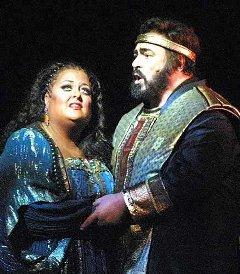Verdi - Aida (Met 2001)
Verdi - Aida (Met 2001)

CD1 1. Part 1 2. part 2 3. Part 3 4. part 4 5. part 5 CD2 1. Part 6 2. part 7 3. Part 8 4. Part 9 5. Part 10 6. Part 11 7. Part 12 Deborah Voigt - Aida Luciano Pavarotti - Radamès Olga Borodina - Amneris Mark Delavan - Amonasro Gennady Bezzubenkov - Ramfis Hao Jiang Tian - King Ronald Naldi - Messenger Marjorie Elinor Dix - Priestess Linda Gelinas, Victoria Rinaldi, Anthony Carr - Dance Metropolitan Opera Orchestra and Chorus James Levine - conductor Metropolitan Opera House.January 27, 2001 Matinee Broadcast
No one should be surprised that for weeks opera chat rooms have been buzzing with speculation that Luciano Pavarotti's performances this month as Radames in Verdi's ''Aida'' at the Metropolitan Opera will be his last with the company. This beloved tenor is 65, an advanced age for an opera singer. He has long been troubled by physical problems that were only partly relieved by hip and knee surgery in 1998. And it's not as if Mr. Pavarotti has been an exemplar of discipline over the years.
On Monday night he sang the first of his five scheduled performances. For those of us who have thrilled to his past artistry and vocal splendor -- and that includes just about every opera fan of the last 30 years -- Mr. Pavarotti's performance was a sad spectacle. He got through it, but at times barely, and only with the indulgence of his colleagues.
In the soprano Deborah Voigt as Aida, the mezzo-soprano Olga Borodina as Amneris, and the baritone Mark Delavan making his Met debut as Amonasro, the Met had three splendid singers in their prime. But their work was hampered by the constant need to make musical allowances for Mr. Pavarotti. In the orchestra pit, James Levine was often reduced to the role of a time-keeper and cue-provider. Whenever Mr. Pavarotti was onstage, all the singers -- indeed, every player in Sonja Frisell's 1988 production -- seemed joined in an effort to prop him up. No one expects a hefty elderly tenor to look like the young conquering leader of the Egyptian army. But he should at least sound heroic. When Mr. Pavarotti sang the first phrases of dramatic recitative that set up Radames's aria ''Celeste Aida,'' there were flashes of that Pavarotti sound: warm, rich, husky, full of color. We may have to wait a long time for a tenor to come along who can match it. Mr. Pavarotti knows that, which is why it must be so hard for him to stop.
But once the aria actually began, his singing became quite insecure, and he must know that, too. The initial phrases sweep upward in a series of lyrical arcs to sustained top notes. He had trouble sustaining the line. Only someone with Mr. Levine's technique and sensitivity to singers could have followed Mr. Pavarotti's needs as his breath gave out in one phrase, or as he jumped a beat in the next.
Mr. Pavarotti's glory has been his high notes, and he still delivered them sometimes. But to do so now, he must conserve his energy and pace himself. His eyes were often fixed on the prompter, and he did not seem to know the music well enough. He rallied for Act Four, his most consistent singing of the night. That portion of the score may be the most fresh in his mind, as he sang that act as part of his 30th-anniversary gala at the Met in 1998.
The sorry image that captured the overall performance came during the Triumphant Scene, as the stage filled with Egyptian soldiers, cheering throngs and captured Ethiopians. Radames, the warrior hero, was rolled in on a horse-drawn cart and helped down by two guards. During the choral ensemble, as Aida, Princess Amneris and even the King of Egypt stood before him, Mr. Pavarotti, who has trouble on his feet, sat slumped in a makeshift bench that had been moved to center stage. ---Anthony Tommasini, nytimes.com
